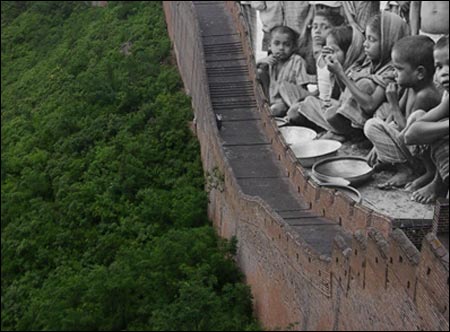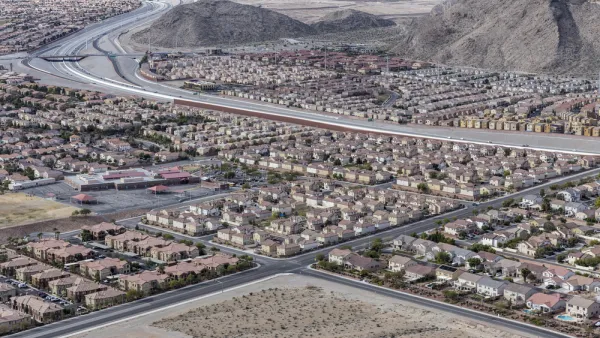Protecting the poor and protecting the environment are two areas we haven’t quite figured out yet. Put them together, and we’re really up a creek. And we are, because these two silos are actually linked very closely. The relationship between poverty and environmental degradation is incredibly complex, but you wouldn’t guess it by looking at some recent policies gathering support out there in the world. Solutions, it would seem, are incredibly simple. But most of these ideas, though well-intentioned, address only one side of the poverty-environment relationship -- and really hurt the other.
Protecting the poor and protecting the environment are two areas we haven't quite figured out yet. Put them together, and we're really up a creek. And we are, because these two silos are actually linked very closely. The relationship between poverty and environmental degradation is incredibly complex, but you wouldn't guess it by looking at some recent policies gathering support out there in the world. Solutions, it would seem, are incredibly simple. But most of these ideas, though well-intentioned, address only one side of the poverty-environment relationship -- and really hurt the other.
Long seen as an affluent concern, environmentalism is largely a movement of the rich, but the problems the rich are fighting against are caused by everyone, rich and poor (though, of course, in varying degrees). Poor people, it's often argued are too poor to worry about protecting the environment, leading to degradation like raw sewage in rivers and slum housing on clearcut rainforests.

The quandary that keeps popping up is where to place policy priorities. Do we serve the needs of an impoverished population, even if it means hurting the environment? Do we put the environment ahead of all, rich or poor? Do we target the affluent lifestyles that cause environmental degradation and let our sympathy enable us to ignore the environmental degradation caused by the poor? Do we focus on improving the environment only in the most polluted and neglected places?
Clearly, there's no one answer, and choosing one solution doesn't have to mean throwing the rest out. But recent policies are turning out to be so single-minded in approach that solving one part of the problem relies on exacerbating another.
In Britain, Prime Minister Gordon Brown has just announced a broad policy proposal that would lift many planning prohibitions in rural areas in order to help the country fill its desperate need for housing. He wants to encourage more development on the outskirts of rural towns, and is willing to pay farmers for allowing their land to be developed towards those means. The intention is noble; Britain (and especially its poor population) needs affordable housing. But this single-minded approach is likely to result in millions of exurban homes that are too far from jobs and services to make their likely low construction costs pan out in the long term for their eventual tenants. It's a poor-first policy that puts every other concern on the other end of the seesaw of problems.
In Brazil, officials have announced plans to construct a 650-meter wall around one of Rio de Janeiro's slum areas in an effort to prevent slum dwellers from moving out and illegally occupying the nearby rainforest. Development in an environmentally sensitive and globally important area like a rainforest is obviously a bad idea. Protecting that land should be a priority. But in this instance, this single goal has taken precedence over the wellbeing of an entire community of people. These people are not only being ignored here, they're being punished. There's no act as literally divisive as building a wall. Separating people from one another (especially along class lines) is not likely to help create a better sense of community or lift anyone out of poverty. It may keep a few people from venturing out into the sensitive rainforest to make a better way of life, so it could technically be a successful environmental protection. But what about the environment left within the walls of the slum, or within the city as a whole?
We're dealing with a very delicate and non-linear food chain. Enhancing or limiting one part is going to have an impact on the rest of the system – good or bad. Urban development, poverty, environmental degradation, economic development, land use and other similar issues are inextricably interrelated, and they all play important roles in this system. Policymakers need to stop compartmentalizing each issue as an individually solvable question. Now, that doesn't necessarily mean taking a completely holistic look at every possible problem and consequence. It just means that creating policies aimed at solving a single problem won't do any good if there's a web of problems needing solutions.

Analysis: Cybertruck Fatality Rate Far Exceeds That of Ford Pinto
The Tesla Cybertruck was recalled seven times last year.

National Parks Layoffs Will Cause Communities to Lose Billions
Thousands of essential park workers were laid off this week, just before the busy spring break season.

Retro-silient?: America’s First “Eco-burb,” The Woodlands Turns 50
A master-planned community north of Houston offers lessons on green infrastructure and resilient design, but falls short of its founder’s lofty affordability and walkability goals.

Test News Post 1
This is a summary

Analysis: Cybertruck Fatality Rate Far Exceeds That of Ford Pinto
The Tesla Cybertruck was recalled seven times last year.

Test News Headline 46
Test for the image on the front page.
Urban Design for Planners 1: Software Tools
This six-course series explores essential urban design concepts using open source software and equips planners with the tools they need to participate fully in the urban design process.
Planning for Universal Design
Learn the tools for implementing Universal Design in planning regulations.
EMC Planning Group, Inc.
Planetizen
Planetizen
Mpact (formerly Rail~Volution)
Great Falls Development Authority, Inc.
HUDs Office of Policy Development and Research
NYU Wagner Graduate School of Public Service


























